If You Need Art To Act, 2024
Live performance, acrylic paint on trash cans, variable duration, 2024. 1st edition at Largo do Carmo, Lisbon, Portugal.
Multimedia installation composed of photo-performance and video, limited edition of 5 + 1 A.P.: 9 photographs printed in mineral pigment on 100% cotton paper, 308g/m² or 310g/m², 10.5 x 16 cm each, and 1 single-channel video, color, 36 s, 2024. Largo do Carmo, Lisbon, Portugal.
Further images
-
(View a larger image of thumbnail 1
)
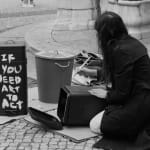
-
(View a larger image of thumbnail 2
)
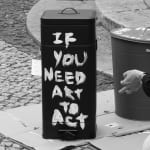
-
(View a larger image of thumbnail 3
)
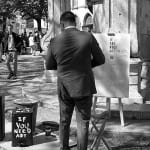
-
(View a larger image of thumbnail 4
)

-
(View a larger image of thumbnail 5
)

-
(View a larger image of thumbnail 6
)

-
(View a larger image of thumbnail 7
)

-
(View a larger image of thumbnail 8
)
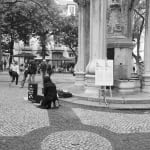
-
(View a larger image of thumbnail 9
)
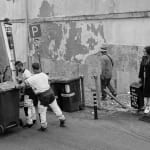
Indifferenziato | Indiferenciado | Non-Recyclable
Challenging Indifference: "If You Need Art to Act" by Analize Nicolini
The title "Indifferenziato | Indiferenciado | Non-Recyclable" is a call to action against indifference. In various languages, the term "indifferenziato" refers to waste that is not recyclable, mixed, and undifferentiated. I use this concept to highlight the critical issue of indifference in waste management. Individuals cannot be indifferent when separating their waste at home, as such negligence impacts the entire recycling chain, affecting everyone from their immediate community to the workers dealing with waste.
During the performance, I write with a brush and white acrylic paint the phrase "If You Need Art to Act" on trash cans. These mundane objects are recontextualized through this act, transforming into focal points for reflection and discussion. This action challenges viewers to rethink waste not as an endpoint but as a beginning, a material full of possibilities for renewal and change. In an era where ecological degradation and climate crises dominate the headlines, my performance emerges as a call to action.
First performed at Largo do Carmo, a historic site resonating with the cultural and social fabric of Lisbon, this performance became a vibrant tableau of environmental consciousness. By choosing such a symbolic place, I deepened the connection between art, community, and the environment. I invite the public to engage with my work not just as spectators but as participants in a broader conversation about sustainability.
My work is a testament to the power of art to provoke reflection and change. My choice of medium — trash cans from ubiquitous brands like IKEA and Zara — serves as a poignant commentary on the pervasive impact of consumerism and classism on the environment. Each painted trash can is not merely an object but a symbol of the daily decisions that contribute to the global ecological struggle. By placing these transformed objects in a public square, I interrupt the routine of daily life, prompting passersby to confront their roles in a consumer society. This work is, therefore, a form of activism.
In previous projects, such as "Ending in Venice" and the "Neon Project" series, I have consistently highlighted the devastating impacts of environmental neglect and the need for proactive engagement, emphasizing the importance of individual actions in the collective effort to achieve sustainability. It draws attention to the fact that the choices we make in our homes reverberate on a larger scale, impacting not only our immediate environment but also putting pressure on our neighbors, family, friends, and public administration to adopt more sustainable practices. This domino effect highlights the power of individual responsibility and the collective impact of our daily actions.
Can art propel us to change our behaviors and adopt more sustainable practices? In "If You Need Art to Act," I extend this dialogue, emphasizing that environmental responsibility is not a passive effort but an active, daily commitment.












